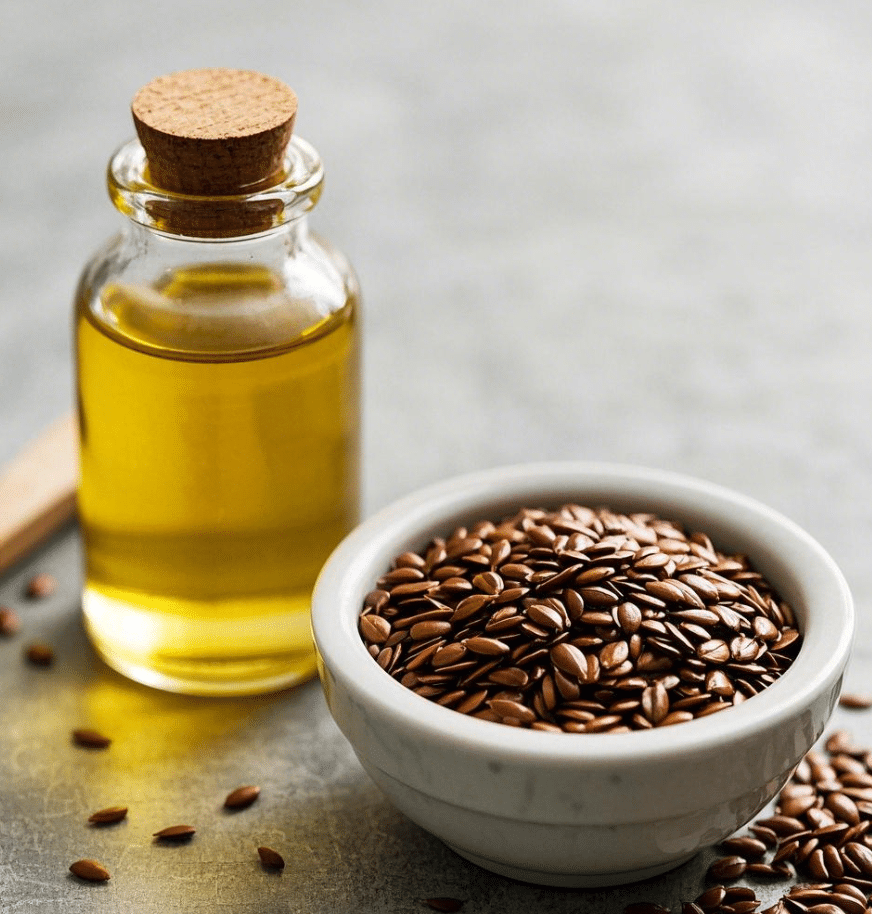
Flaxseed Oil Supplier
Looking for a dependable Flaxseed Oil supplier? Gensei is your dedicated flaxseed oil manufacturer, offering high-quality bulk flaxseed oil and organic flaxseed oil bulk. Our Flaxseed Oil is pressed and processed to preserve its natural goodness, making it an excellent source of essential fatty acids. We are equipped to handle flaxseed oil wholesale orders of all sizes, ensuring a consistent and reliable supply for your business. Partner with Gensei, a reputable flaxseed oil manufacturer and Flaxseed Oil supplier, for all your bulk Flaxseed Oil requirements.
Please note: We are a wholesale supplier and have minimum order quantities.
Have questions about this product? Our team is here to help. For inquiries about multiple ingredients, please use the Contact Us option and include the list of ingredients in your message.
Flaxseed Oil CAS No.: 8001-26-1
Chemical Name: Linseed oil
Synonyms:
- Linseed Oil
- Flax Oil
CB Number: CB4853803
Molecular Formula: Not applicable as it’s a complex mixture of triglycerides. The main fatty acid components are Alpha-Linolenic Acid (C₁₈H₃₀O₂), Linoleic Acid (C₁₈H₃₂O₂), and Oleic Acid (C₁₈H₃₄O₂), incorporated into triglyceride structures.
Molecular Weight: Not applicable as it’s a mixture. The molecular weight of triglycerides varies depending on the fatty acids attached, but is generally in the range of 800-900 g/mol.
MDL Number: MFCD00037154

Flaxseed Oil Manufacturing Process Flowchart (Cold Pressing)
Flaxseed oil is typically extracted from flax seeds using a cold-pressing method to preserve its nutritional quality.
(Cleaned and dried flax seeds)
(Removing impurities, debris, and damaged seeds)
(Flax seeds are mechanically pressed at low temperatures to extract the oil without using heat or chemicals)
(The extracted crude oil is filtered to remove solid particles and sediment)
(May undergo additional filtration or light refining to improve clarity and stability, while minimizing nutrient loss)
(Testing for fatty acid profile, purity, peroxide value, acid value, and other specifications)
(The purified Flaxseed Oil is packaged in airtight, light-resistant containers and stored under cool conditions to prevent oxidation)
This flowchart outlines the general process for manufacturing Flaxseed Oil via cold pressing. Specific steps and equipment may vary depending on the manufacturer.
Why Choose Gensei as Your Flaxseed Oil Supplier?
Choosing Gensei as your Flaxseed Oil supplier ensures you receive high-quality oil from a trusted flaxseed oil manufacturer. We specialize in providing premium bulk flaxseed oil, including certified organic flaxseed oil bulk. Our oil is produced through careful processes like cold-pressing to preserve its rich Omega-3 content (ALA).
We offer competitive pricing for flaxseed oil wholesale orders, catering to businesses of all sizes. Our commitment to quality and reliability makes us the ideal Flaxseed Oil supplier for your nutritional, cosmetic, or industrial needs. Partner with Gensei for consistent, high-grade bulk flaxseed oil.
Features and Benefits
- High Omega-3 Content: Rich in Alpha-Linolenic Acid (ALA), an essential omega-3 fatty acid.
- Appearance: Typically golden yellow to brownish-yellow in color.
- Taste: Has a mild, nutty flavor, which can become bitter if rancid.
- Sensitivity: Highly susceptible to oxidation (going rancid) when exposed to heat, light, and air due to its high level of polyunsaturated fats. Requires refrigeration and proper storage.
Applications
- Dietary Supplements: Widely used in softgel capsules or liquid form as an Omega-3 supplement, particularly for vegetarians and vegans.
- Food Industry: Used in salad dressings, dips, and added to smoothies or yogurt. It is generally not used for high-heat cooking due to its low smoke point and susceptibility to oxidation.
- Cosmetics: Used in some skincare and hair care products for its moisturizing and nourishing properties.
- Industrial Uses: Historically used in paints, varnishes, and linoleum (where it’s called linseed oil).
Our State-of-the-Art Manufacturing Facilities
Explore our modern facilities equipped with advanced technology to ensure the highest quality in the production of your vitamins, herbal extracts, minerals, and amino acids.











FAQs
Some anecdotal evidence suggests that flaxseed oil might help increase milk supply in breastfeeding mothers, potentially due to its essential fatty acid content. However, scientific research specifically confirming this effect is limited. Consult with a healthcare provider or lactation consultant.
Yes, flaxseed oil is considered good for health, primarily because it is an excellent source of Alpha-Linolenic Acid (ALA), an essential omega-3 fatty acid. Omega-3s are beneficial for heart health, reducing inflammation, and overall well-being.
No, you should not cook with flaxseed oil, especially at high heat. It has a very low smoke point and is highly susceptible to oxidation when heated, which can destroy its beneficial omega-3s and produce harmful compounds. It is best used in cold applications like salad dressings or added to food after cooking.
Both flaxseed oil and fish oil are good sources of omega-3 fatty acids but contain different types. Fish oil provides EPA and DHA, which are readily used by the body. Flaxseed oil provides ALA, which the body must convert into EPA and DHA, and this conversion process is relatively inefficient. Fish oil is generally considered a more direct source of the most active omega-3 forms (EPA/DHA) for many people. The "better" choice depends on individual dietary needs and preferences (e.g., vegetarian/vegan).
Yes, flaxseed oil does expire and is highly perishable due to its high polyunsaturated fat content. It can go rancid quickly when exposed to heat, light, or air. Check the expiration date and store it properly.
Yes, flax oil and flaxseed oil are the same thing. "Linseed oil" is also a synonym, though that term is sometimes used more in industrial contexts.
Yes, flaxseed oil can be good for the skin. Its omega-3 content and other fatty acids can help support skin hydration, reduce inflammation, and improve skin barrier function when taken orally or applied topically in some formulations.
High-quality, fresh flaxseed oil has a mild, slightly nutty, or earthy flavor. If it tastes bitter, fishy, or has a strong unpleasant odor, it is likely rancid and should not be consumed.
Expired or rancid flaxseed oil should not be consumed. It can be disposed of properly, often by sealing it in a container and discarding it with regular waste. Do not pour it down the drain. It might potentially be used for non-food purposes like conditioning wood or metal if it's not heavily degraded, but this requires caution.
Flaxseed oil can be used on hair as a moisturizing treatment. You can apply a small amount to the scalp and hair, leave it on for a period (e.g., 30 minutes or overnight), and then wash your hair. It can also be used in homemade hair masks.
Yes, you can take flaxseed oil and fish oil together. This can provide a broader spectrum of omega-3 fatty acids (ALA from flaxseed oil, and EPA/DHA from fish oil).
Yes, due to its high susceptibility to oxidation, flaxseed oil must be refrigerated after opening to help maintain its freshness and prevent it from going rancid. It should also be stored in an opaque bottle away from light and heat.
Yes, flaxseed oil can have a mild laxative effect for some people, helping to promote bowel regularity. This is likely due to its lubricating properties and potential to stimulate the digestive system.
Yes, flaxseed oil is a type of seed oil, as it is extracted from the seeds of the flax plant.
Flaxseed oil is good for supporting cardiovascular health (by providing ALA), reducing inflammation, supporting brain health, promoting digestive regularity, and potentially benefiting skin, hair, and nail health.
Studies on using flaxseed oil to lower cholesterol have shown varying results. Dosages used in research often range from 1 to 3 tablespoons (15-45 ml) per day. It's important to note that while flaxseed oil may help lower LDL ("bad") cholesterol in some individuals, dietary changes and other lifestyle factors are also crucial for managing cholesterol. Consult with a healthcare professional.
Yes, flaxseed oil can be good for constipation. Its mild laxative effect and lubricating properties can help ease bowel movements.
The smoke point of unrefined flaxseed oil is relatively low, typically around 225°F (107°C). Refined versions may have a slightly higher smoke point, but it is still not suitable for high-heat cooking.
Yes, flaxseed oil and linseed oil are essentially the same product derived from the seeds of the flax plant (Linum usitatissimum). The term "linseed oil" is often used more in industrial applications (paints, varnishes, etc.), while "flaxseed oil" is more commonly used for the food-grade product intended for human consumption.

